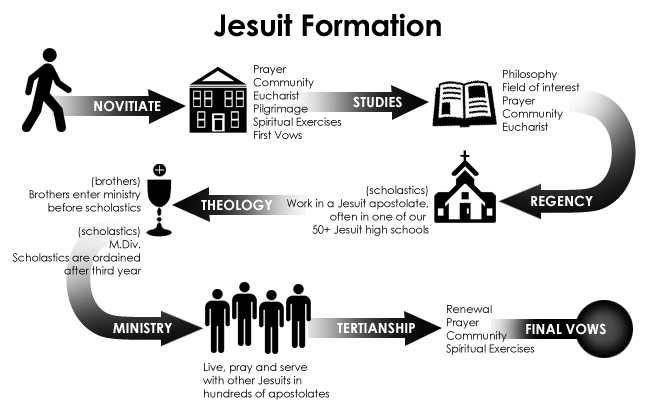
This image that shows the stages of formation of Jesuits was taken from the website of the Jesuits in Canada.
The path to entering the Society of Jesus is long and hard. It requires a deep faith in God, an understanding of oneself and continuous study. Many young men hear the call and find ways of serving as spiritual guides, teachers, academic, social activists, community workers, artists, scientists. This section hopes to answer some of the questions about joining the Jesuits.
- How does a candidate enter the Jesuits?
Through formal application. With the approval of his spiritual director and the Province Formation Assistant, a candidate makes formal application for entrance. This application process can take anywhere from six to twelve months. - When do applications usually begin?
Applications in Africa can occur anytime during the year but are usually concluded by May or June of a respective year before admission to Novitiate is granted in August. - How long does the application process take?
Generally, applications can take 8-10 months, depending on how quickly the candidate can get all the paper work in and schedule their interviews. Applications are usually approved in May or June depending upon the African Province. - What does the application process involve?
Completion of: the formal application, a spiritual autobiography, several interviews, several references, academic transcripts, sacramental records, birth certificate. All these documents are collected by the Formation Assistant and presented to the local Provincial, who then makes the final decision regarding the acceptance of a candidate to the Jesuit novitiate. - Who makes the decision about a candidate's acceptance into the Jesuits?
The local Jesuit Provincial makes the decision to accept a man's application, to defer it, or to deny it. - When does a man officially become a Jesuit?
If accepted, a man becomes a Jesuit on Entrance Day-usually in late August. This is the day when the candidate enters the novitiate community and becomes a novice. From this point the Society of Jesus provides for the man's livelihood and financial needs. For his wellbeing, the Jesuit novice places his trust in the master of novices, the Jesuit provincial, and God. After living as a novice for a period of two years, the new Jesuit then asks to pronounce his first vows of poverty, chastity, and obedience in the Society of Jesus. - Who should an aspiring candidate address himself to?
The first step to becoming a Jesuit is researching the Order thoroughly, exploring one's own faith and reading about the life of St Ignatius of Loyola. Below are some resources that might assist in your aspiration. Following this contact either your local parish priest, a spiritual director, a Jesuit whom you know, or a priest whom you might respect. - Read this booklet to understand more about Jesuits in Rwanda-Burundi: General Presentation of Jesuits in Rwanda-Burundi.pdf
If you feel a call to become a Jesuit, contact our vocation promoters
Fr. BIHORUBUSA Pascal, SJ (Coordinator of vocations promotion in Burundi)
Email : jesuitvocationsb@gmail.com
Tél: (257) 66 33 61 05
Fr. Ngiyembere Ernest, SJ (Coordinator of vocations promotion in Rwanda)
Email: rwandajesuitvocations@gmail.com
Tél: (250) 785 655 874
Nsabimana Jean de la Croix, SJ (Regional coordinator for vocations promotion)
vocationspromotionrwb@gmail.com
Tél: (250) 794 324 194
